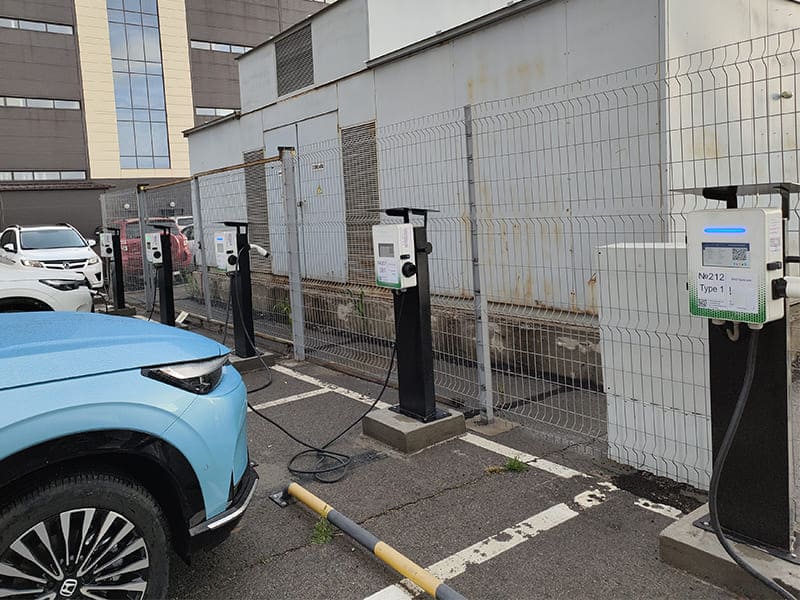With the rapid rise of electric vehicles (EVs), businesses are presented with an exciting opportunity to not only contribute to environmental sustainability but also create new revenue streams. Installing an EV charger station at your business can offer multiple benefits, from attracting more customers to improving your company’s reputation as a green and forward-thinking enterprise. This article will explore the advantages of installing a business EV charger station, the potential for profit, and the key factors to consider when making this investment.
The Growing Demand for Electric Vehicles
Electric vehicles have seen significant growth in recent years. According to the International Energy Agency (IEA), the global electric car stock reached 85 million vehicles in 2025, with an annual growth rate of over 40%. This trend shows no signs of slowing down as governments around the world continue to offer incentives for EV purchases and adopt policies aimed at reducing carbon emissions.
As the number of EVs on the road increases, so does the need for reliable charging infrastructure. Businesses that offer EV charging stations are well-positioned to capitalize on this shift toward electric mobility. Not only will they attract EV owners who need to charge their vehicles, but they will also improve their brand image by supporting a sustainable future.
The Business Case for Installing an EV Charger Station
-
Attract More Customers
One of the most immediate benefits of installing an EV charger station is the ability to attract more customers. As EV ownership continues to rise, drivers need places to charge their vehicles. If your business offers EV charging, you could attract these drivers who may not have visited otherwise.
An EV charging station could turn your business into a “destination” for EV owners. For example, a café, shopping center, or hotel that offers charging stations can become a go-to stop for people looking to recharge their car while enjoying a coffee or doing some shopping. This gives you a chance to increase foot traffic and customer spending.
-
Generate Revenue from Charging Fees
The most obvious way to profit from an EV charging station is by charging customers a fee for using the service. Charging fees vary based on the type of station and the region, but typically, businesses can charge either per hour or per kilowatt-hour (kWh) of energy used.
Some businesses charge a flat rate for a full charge, while others offer tiered pricing based on the time of day, usage frequency, or energy consumption. For example, charging during peak hours may cost more than during off-peak times.
Additionally, there are subscription-based models where customers pay a monthly fee for access to the charger, ensuring consistent revenue. By offering EV charging at your business, you create a new income stream that continues to grow as EV adoption expands.
-
Increase Dwell Time and Customer Spend
EV charging stations encourage customers to spend more time at your business, which increases the likelihood of additional purchases. While waiting for their vehicle to charge, customers may shop, dine, or use other services you offer. This extended dwell time benefits businesses that rely on foot traffic, such as retail stores, restaurants, and leisure facilities.
Studies show that businesses with EV charging stations see higher customer retention and more frequent visits. The ability to charge while conducting business gives EV drivers a reason to return, making them more likely to become loyal customers.
-
Leverage Government Incentives and Rebates
In many regions, government programs provide financial incentives to businesses that install EV chargers. These incentives can cover a significant portion of the installation costs. Depending on the location, businesses can access rebates, tax credits, and subsidies that make the upfront investment more affordable.
For instance, the U.S. offers tax credits through the federal government’s Clean Cities program, which helps businesses reduce the cost of purchasing and installing EV charging stations. In Europe, countries like Germany and the Netherlands offer subsidies for the installation of EV chargers in public and private spaces.
These government incentives make installing EV chargers even more attractive for businesses. The long-term financial return from increased customer visits and charging fees can far outweigh the initial investment.
-
Enhance Corporate Sustainability and Brand Image
Installing an EV charger station helps position your business as environmentally conscious, which is increasingly important to consumers. As environmental concerns rise, many customers prefer to engage with brands that align with their values.
Businesses that support clean energy solutions are often viewed as responsible corporate citizens. This can lead to stronger brand loyalty and positive word-of-mouth marketing. As more consumers prioritize sustainability, offering EV charging facilities at your business can improve your reputation and attract eco-conscious customers.
-
Future-Proof Your Business
As the transition to electric vehicles continues, businesses that adapt early will have a competitive advantage. By installing an EV charger station now, you future-proof your business against growing consumer demand for EV infrastructure. In the coming years, more and more businesses will likely install EV chargers, so getting ahead of the curve can help establish your business as a leader in this emerging market.
Moreover, as technology improves, future EV charging solutions may be faster, more efficient, and better integrated with renewable energy sources. Installing an EV charger station today sets the stage for future upgrades that can further benefit your business.
Key Considerations When Installing a Business EV Charger Station
While the benefits of installing an EV charger station are clear, it is essential to consider a few factors before making the investment. Below are some of the most important aspects to evaluate:
-
Cost of Installation and Maintenance
The initial installation cost for an EV charger station can range from a few thousand to tens of thousands of dollars, depending on the size and type of charging equipment. Additional costs may include ongoing maintenance, electricity usage, and software fees for managing the charging network.
Before moving forward, assess the overall cost and compare it with the expected return on investment. Many businesses find that government rebates and incentives can help offset these costs. Over time, the revenue generated from charging fees and increased customer visits will help you recoup the initial investment.
-
Location and Accessibility
The location of your EV charger station plays a critical role in attracting customers. It must be easily accessible to EV drivers and located in a high-traffic area where potential customers will see the station. Ensure that the charging station is in a well-lit, secure area that is convenient for drivers to park.
-
Charging Speed and Equipment
The type of charger you install matters. There are different levels of EV chargers, from Level 1 (slow charging) to Level 3 (fast charging). Depending on your business type, you may want to offer faster charging options that allow customers to charge their vehicles in a short amount of time.
Level 3 chargers, also known as DC fast chargers, are ideal for locations where drivers need to charge quickly, such as along highways or at large commercial properties. However, these chargers come with higher installation and equipment costs.
-
Charging Network and Payment Systems
When installing a business EV charger, consider how you will manage payments. Some businesses choose to operate their own payment systems, while others partner with third-party charging networks. Third-party providers often handle payments, customer support, and software updates.
Ensure that your payment systems are user-friendly and accessible to all EV drivers. Offering various payment methods, such as credit cards, mobile apps, and subscription services, can help increase usage and customer satisfaction.
As electric vehicles continue to become more mainstream, businesses that install EV charging stations are poised to reap the rewards. From attracting more customers to generating a new revenue stream, the benefits are clear. Additionally, with government incentives, a growing emphasis on sustainability, and a future-oriented approach, EV charger stations can contribute to your business’s long-term success.
By considering the installation costs, location, and types of chargers, you can ensure that your investment in a business EV charger station will provide significant returns. The future of transportation is electric, and businesses that embrace this change will be better positioned to thrive in an increasingly eco-conscious world.

